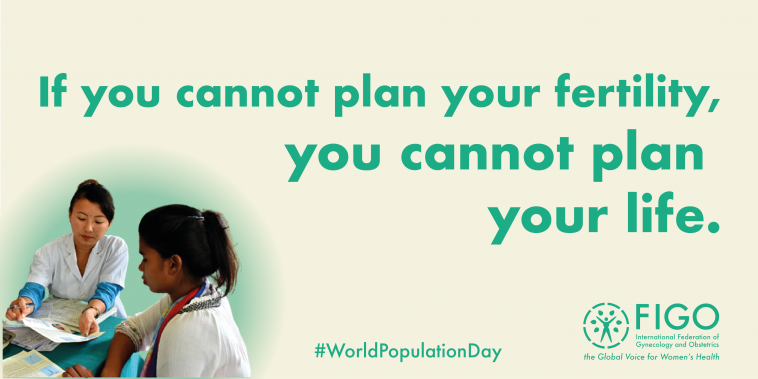World Population Day: Prioritising family planning during COVID-19
11th July marks World Population Day – an opportunity for the global community to raise awareness of population issues. This year’s theme highlights the need to prioritise the reproductive health and rights of all people, regardless of shifts in fertility rates

Ahead of World Population Day 2021, FIGO HQ spoke with Jill Sheffield, Chair of FIGO’s Committee on Contraception and Family Planning, about the implications of the pandemic for the fulfilment of women and girls’ sexual and reproductive health and rights. We also discussed the need for interventions to ensure the continuation of family planning services during and after the pandemic.
The disruption of family planning services during the pandemic
The UNFPA highlights that the COVID-19 crisis is having a strong impact on fertility worldwide, as “while those with access to sexual and reproductive health services historically delay childbearing in times of fiscal uncertainty or crisis, disruptions in supply of contraceptives in combination with lockdowns are predicted to result in a sharp rise in unplanned pregnancies for the most vulnerable”. In a survey published in April 2021, the World Health Organization found that more than 40% of countries reported disruptions to family planning and contraception services as a result of COVID-19.
According to Sheffield, the provision of family planning and contraceptive services already faced serious challenges before the pandemic, and these issues have only been deepened by the global crisis.
“The unmet need for family planning information services and supplies was enormous before the pandemic – some 214 million girls and women wanted to plan their pregnancy but were unable to access appropriate care before the pandemic struck. Those numbers have only increased dramatically.”
– Jill Sheffield, Chair, Committee on Contraception and Family Planning
Disparities have been exacerbated, with the most vulnerable populations facing further marginalisation as a result of the pandemic: increased risk of child marriages for girls, human rights abuses against the elderly, and violence against women and girls with disabilities are just a few examples. Jill Sheffield points out that “in addition, the pandemic has revealed an increase in gender-based violence and harmful practices, as well as an increase in maternal deaths, undermining progress which had been made on all of these fronts.”
Ways forward
Jill Sheffield explains that throughout the pandemic, the committee has repeated that “If you cannot plan your fertility, you cannot plan your life.” This is why it is so important that the delivery of family planning services improves, but also that policy makers learn from the challenges of this crisis to ensure better care in the future. The disproportionate impact that COVID-19 has had on women and girls worldwide means that targeted policies and investments for women and girls’ health and wellbeing are vital to make up for the major setbacks caused.
“It is essential that family planning services and supplies remain available during times of crisis. FIGO believes that contraception and family planning services need to be identified as an essential health service to ensure that staffing and services remain a priority everywhere. This is not the case in too many countries.”
– Jill Sheffield, Chair, Committee on Contraception and Family Planning
According to Sheffield, “tremendous strides [have been made] in shaping a better world. Yet millions of girls and women still face daunting barriers to realising their sexual and reproductive health and rights. COVID-19 has caused setbacks, widening the gaps for [them].” Despite these barriers, there is hope – we have seen adaptations taking place to meet the challenges that the pandemic has exacerbated. It is essential to look for ways to innovate, and to continue advocating for practices – such as telehealth and telemedicine – that mitigate the effects of crises.
Access to contraceptive and family planning services is a fundamental human right, and health systems must be able to adapt to respond to crises to ensure the continuity of care. In particular, it is important that policy makers:
- expand postpartum family planning services, particularly long-acting reversible contraceptives (LARCs) such as contraceptive implants, postpartum intrauterine devices (IUDs) or injectables
- implement telemedicine/telehealth using mobile phones and social media as an adjunct to improving information and access to contraception
- lift barriers to accessing contraception and abortion by simplifying processes without compromising women and girls’ safety
- anticipate and address likely supply chain needs and challenges
- keep quality of care at the centre of all strategies, as it is a key element for expanding rights and choices for effective contraception and family planning.
FIGO and our Committee on Contraception and Family Planning will continue to highlight how COVID-19 is changing – and needs to change – the delivery of care, and to expose the flaws and inequities in our health systems.
“Bringing these [inequities] to light provides an opportunity for renewed commitment to seize on the best ideas for improvement and to address the structural weaknesses that exist. This won’t happen overnight, but we now have a springboard for rethinking how quality care can be delivered.”
– Jill Sheffield, Chair, Committee on Contraception and Family Planning